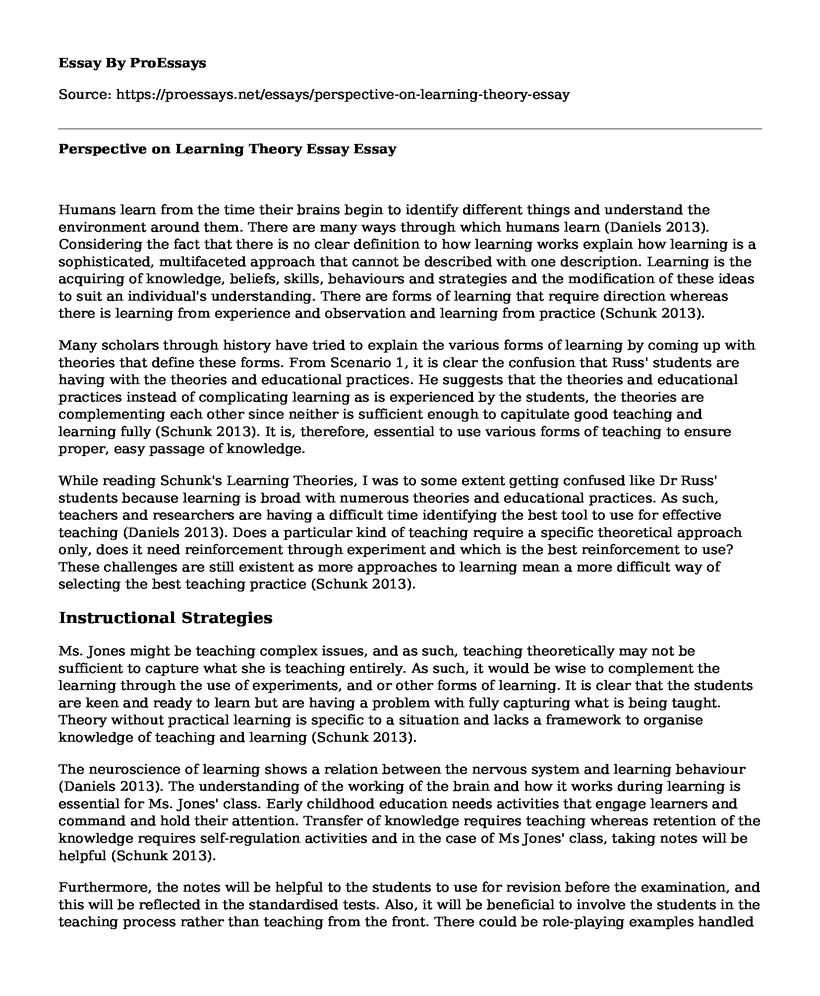Humans learn from the time their brains begin to identify different things and understand the environment around them. There are many ways through which humans learn (Daniels 2013). Considering the fact that there is no clear definition to how learning works explain how learning is a sophisticated, multifaceted approach that cannot be described with one description. Learning is the acquiring of knowledge, beliefs, skills, behaviours and strategies and the modification of these ideas to suit an individual's understanding. There are forms of learning that require direction whereas there is learning from experience and observation and learning from practice (Schunk 2013).
Many scholars through history have tried to explain the various forms of learning by coming up with theories that define these forms. From Scenario 1, it is clear the confusion that Russ' students are having with the theories and educational practices. He suggests that the theories and educational practices instead of complicating learning as is experienced by the students, the theories are complementing each other since neither is sufficient enough to capitulate good teaching and learning fully (Schunk 2013). It is, therefore, essential to use various forms of teaching to ensure proper, easy passage of knowledge.
While reading Schunk's Learning Theories, I was to some extent getting confused like Dr Russ' students because learning is broad with numerous theories and educational practices. As such, teachers and researchers are having a difficult time identifying the best tool to use for effective teaching (Daniels 2013). Does a particular kind of teaching require a specific theoretical approach only, does it need reinforcement through experiment and which is the best reinforcement to use? These challenges are still existent as more approaches to learning mean a more difficult way of selecting the best teaching practice (Schunk 2013).
Instructional Strategies
Ms. Jones might be teaching complex issues, and as such, teaching theoretically may not be sufficient to capture what she is teaching entirely. As such, it would be wise to complement the learning through the use of experiments, and or other forms of learning. It is clear that the students are keen and ready to learn but are having a problem with fully capturing what is being taught. Theory without practical learning is specific to a situation and lacks a framework to organise knowledge of teaching and learning (Schunk 2013).
The neuroscience of learning shows a relation between the nervous system and learning behaviour (Daniels 2013). The understanding of the working of the brain and how it works during learning is essential for Ms. Jones' class. Early childhood education needs activities that engage learners and command and hold their attention. Transfer of knowledge requires teaching whereas retention of the knowledge requires self-regulation activities and in the case of Ms Jones' class, taking notes will be helpful (Schunk 2013).
Furthermore, the notes will be helpful to the students to use for revision before the examination, and this will be reflected in the standardised tests. Also, it will be beneficial to involve the students in the teaching process rather than teaching from the front. There could be role-playing examples handled by the students which bring to life a particular story and thus formulate a good memory which is not easy to forget (Daniels 2013). Motivation is also a right way of affecting the neural connections. In the case of Ms Jones, it is possible to help the students take the exams more seriously if they knew that there is a possibility of having a reward for good performance. If all these are implemented, Ms Jones' social studies class will improve how they learn, and these will be reflected in the examinations (Schunk 2013).
References
Daniels, H., (2013). Educational Theories, Cultures and Learning: A Critical Perspective. London: Routledge.
Schunk, D. H. (2013). Learning Theories: An Educational Perspective. Harlow: Pearson Education UK.
Cite this page
Perspective on Learning Theory Essay. (2022, Jun 19). Retrieved from https://proessays.net/essays/perspective-on-learning-theory-essay
If you are the original author of this essay and no longer wish to have it published on the ProEssays website, please click below to request its removal:
- Adolescent Depression - Essay Example on Psychology
- Essay on Teaching Frameworks for Professional Practices in Education
- Essay Sample on Mindfulness: Beyond Assumptions - Exploring Its True Nature
- Social & Emotional Welfare: Beyond Cognitive Capabilities - Research Paper
- Essay Example on Data Literacy: Propelling Workforce to Success
- Paper Example on Mental Disorders and Psycho-Behavioral Challenges on the Rise in China
- Essay Example on the Science of Aging: Exploring Gerontology and its Effects







